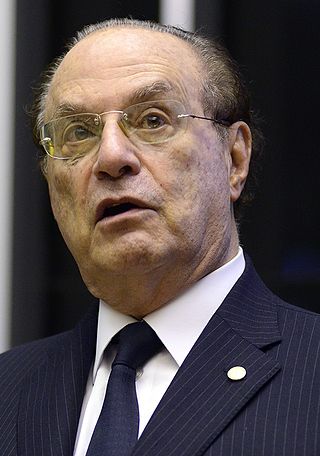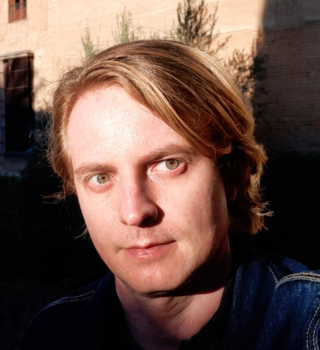Related Research Articles

The First Brazilian Republic, also referred to as the Old Republic, officially the Republic of the United States of Brazil, refers to the period of Brazilian history from 1889 to 1930. The Old Republic began with the coup d'état that deposed emperor Pedro II in 1889, and ended with the Revolution of 1930 that installed Getúlio Vargas as a new president. During the First Republic, the country's presidency was dominated by the most powerful states of São Paulo and Minas Gerais. Because of the power of these two states, based on the production of coffee and dairy, respectively, the Old Republic's political system has been described as "milk coffee politics". At local level, the country was dominated by a form of machine politics known as coronelism, in which the political and economic spheres were centered around local bosses, who controlled elections.

São Paulo is the most populous city in Brazil, the Americas, and the Western Hemisphere and is the capital of the state of São Paulo. Listed by the Globalization and World Cities Research Network (GaWC) as an alpha global city, it exerts substantial international influence in commerce, finance, arts, and entertainment. It is the largest urban area by population outside Asia and the most populous Portuguese-speaking city in the world. The city's name honors Paul the Apostle and people from the city are known as paulistanos. The city's Latin motto is Non ducor, duco, which translates as "I am not led, I lead."

The Green Party is a political party in Brazil. It was constituted after the military dictatorship period when limitations on party development were lifted, and, like other green parties around the world, is committed to establishing a set of policies on ensuring social equity and sustainable development. One of the party's founding members was the journalist and former anti-dictatorship revolutionary Fernando Gabeira, Alfredo Sirkis and Carlos Minc. The founding of the Rio de Janeiro section of the Brazilian Green Party was led by a delegation from the southern Brazilian state of Santa Catarina, composed among others by Olga Maria Carvalho Luz, Luiz Henrique Gevaerd Odebrecht, Marcos Bayer, and Consuelo Luz Lins.

The Vargas Era is the period in the history of Brazil between 1930 and 1946 when the country was governed by president Getúlio Vargas. The period from 1930 to 1937 is known as the Second Brazilian Republic, and the other part of Vargas Era, from 1937 until 1946 is known as the Third Brazilian Republic.

The Brazilian Social Democracy Party, also known as the Brazilian Social Democratic Party or the Party of Brazilian Social Democracy, is a political party in Brazil. As the formerly third largest party in the National Congress, the PSDB was the main opposition party against the Workers' Party (PT) administrations of Luiz Inácio Lula da Silva and Dilma Rousseff from 2003 to 2016.

The Socialism and Liberty Party is a left-wing political party in Brazil. The party describes itself as socialist and democratic.

São Paulo Forum (FSP), also known as the Foro de São Paulo, is a conference of left-wing political parties and organizations from the Americas, primarily Latin America and the Caribbean. It was launched by the Workers' Party of Brazil in 1990 in the city of São Paulo.

Progressistas is a centre-right to right-wing political party in Brazil. Founded in 1995 as the Brazilian Progressive Party, it emerged from parties that were successors to ARENA, the ruling party of the Brazilian military dictatorship. A pragmatist party, it supported the governments of presidents Fernando Henrique Cardoso, Luiz Inácio Lula da Silva, Dilma Rousseff, Michel Temer and Jair Bolsonaro. Largely it was the party of the politics of Paulo Maluf, a former governor and mayor of São Paulo. Of all political parties, in corruption investigation Operation Car Wash, the Progressistas had the most convictions.

Poá is a municipality in the state of São Paulo in Brazil. The water extracted from Fonte Áurea, or the Golden Fountain, is sold throughout Brazil. The population is 103,765 in an area of 17.26 km2.

B3 S.A.– Brasil, Bolsa, Balcão, formerly BM&FBOVESPA, is a stock exchange located in São Paulo, Brazil, and the second oldest of the country.

Paulo Salim Maluf is a Brazilian politician with a career spanning over four decades and many functions, including those of State Governor of São Paulo, Mayor of the City of São Paulo, Congressman and Presidential candidate. His political base is founded on populism and the provision of major public works.
Access to at least basic water increased from 94% to 97% between 2000 and 2015; an increase in access to at least basic sanitation from 73% to 86% in the same period;
Environmental issues in Brazil include deforestation, illegal wildlife trade, illegal poaching, air, land degradation, and water pollution caused by mining activities, wetland degradation, pesticide use and severe oil spills, among others. As the home to approximately 13% of all known species, Brazil has one of the most diverse collections of flora and fauna on the planet. Impacts from agriculture and industrialization in the country threaten this biodiversity.
Irrigation in Brazil has been developed through the use of different models. Public involvement in irrigation is relatively new while private investment has traditionally been responsible for irrigation development. Private irrigation predominates in the populated South, Southeast, and Center-West regions with most of the country’s agricultural and industrial development. In the Northeast region, investments made by the public sector seek to stimulate regional development in an area prone to droughts and with serious social problems. These different approaches have resulted in diverse outcomes. Of the 120 million hectares (ha) that are potentially available for agriculture, only about 3.5 million ha are under irrigation, although estimates show that 29 million ha are suitable for this practice.
Water resources management is a key element of Brazil's strategy to promote sustainable growth and a more equitable and inclusive society. Brazil's achievements over the past 70 years have been closely linked to the development of hydraulic infrastructure for hydroelectric power generation and just recently to the development of irrigation infrastructure, especially in the Northeast region.

The Homeless Workers Movement is a social movement in Brazil. It originated from the Movimento dos Trabalhadores Rurais Sem Terra. Although the MTST can trace its first urban activism efforts to the occupation of Campinas in São Paulo during the 1997 National People's March, this intervention was organized within the Landless Rural Worker's Rural Movement (MST) structure. The first proper occupation as a new sociopolitical actor, distinct from the MST, took place in Guarulhos in 2002. It was named after Anita Garibaldi, considered to be a radical social reformer during her lifetime.
Flávio de Rezende Carvalho (1899–1973) was a Brazilian architect and artist.

The Right to the City is a concept and slogan that emphasizes the need for inclusivity, accessibility, and democracy in urban spaces. The idea was first articulated by French philosopher Henri Lefebvre in his 1968 book Le Droit à la Ville, in which he argued that urban space should not be solely controlled by market forces, such as commodification and capitalism, but should be shaped and governed by the citizens who inhabit it.

Richard Miskolci is a Brazilian sociologist. He is Full Professor of Sociology at UNIFESP, Brazil, and also a researcher of CNPq. Miskolci is the leader of the Research Center Quereres.
Circles of Sustainability is a method for understanding and assessing sustainability, and for project management directed towards socially sustainable outcomes. It is intended to handle 'seemingly intractable problems' such as outlined in sustainable development debates. The method is mostly used for cities and urban settlements.
References
- ↑ The City Statute: A Commentary. Sao Paulo, Brazil: Cities Alliance and Ministry of Cities. 2010. p. 120. Archived from the original on 2014-03-06. Retrieved 2013-01-06.
- ↑ The City Statute of Brazil: A commentary Archived 2012-07-06 at the Wayback Machine , The Cities Alliance, 2010
- 1 2 3 "Implementing the Right to the City in Brazil?", Sustainable Cities Collective, 2012
- ↑ Misusing the City Statute in São Paulo, Patricia Rodrigues Samora, Polis, 2012